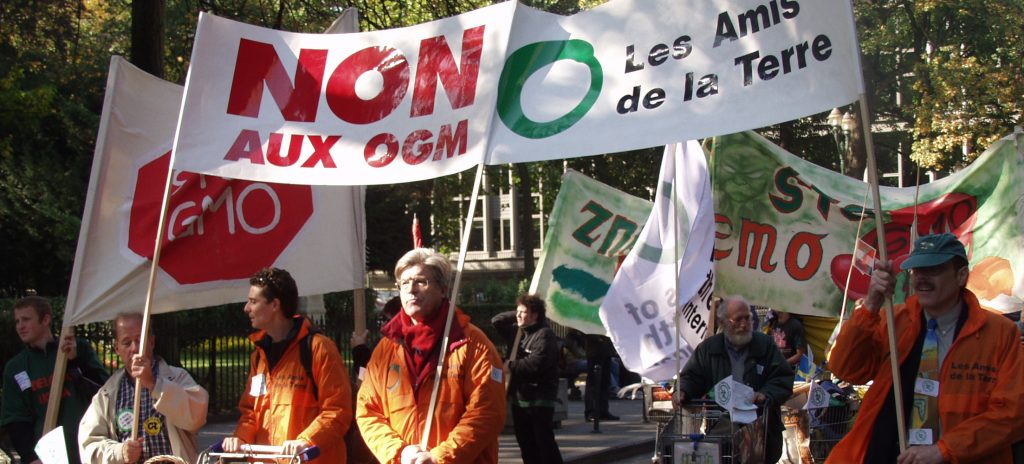Farming, consumer co-operative and environmental groups today called for the European Union to significantly strengthen its rules on genetically modified crops in order to introduce more realistic solutions to world hunger whilst protecting European consumers and farmers. The call comes as Environment ministers meet tomorrow to discuss for the first time new proposed legislation on genetically modified crops.
Two years ago Environment ministers called for better safety checks when authorising new crops and also for the socio-economic impacts to be taken into consideration (1) , a call so far largely ignored by the European Commission. At tomorrow’s Council meeting, ministers will discuss new proposals to allow some member states to ban GM crops under certain conditions but fail to introduce any protection for farmers and consumers in countries that may choose to grow GM crops.
Fergal Anderson, food campaigner at the farming organisation European Coordination Via Campesina said: “GMOs offer nothing to our society but more agrochemicals, more biodiversity loss and an increasing control of transnational corporations in the food chain. Sustainable family farm agriculture can feed Europe and the world without GMOs – but many of our farmers in Spain have been forced to abandon their production of maize due to GM contamination. Following the current model will only destroy the world’s best alternatives”
Mute Schimpf, food campaigner with Friends of the Earth Europe said: “If GM crops are allowed to be planted over a larger area then in time all of Europe will be contaminated. The genie will be well and truly out of the bottle. Environment ministers must stick to their demands for a complete review of the safety rules and put the public and the environment before the profit of the biotech companies.”
Rosita Zilli, policy adviser for sustainability at Euro Coop, the European Community of Consumer Cooperatives, said: “Consumer co-operatives across Europe are striving to adapt their food supply so that it reflects the concerns, values and convictions of their consumer-members. Despite the cost and complexity involved, some co-operatives have totally eliminated GMOs from their own brand products, instructing suppliers to use certified GM-free feed and providing clear labels as a result. In such way they are concretely offering to their consumers an effective right-to-choose in their everyday purchases. We call therefore the EU ministers to ensure that such fundamental right is factually preserved through a strong and unified EU approach.”
The Commission is asking member states to relax opposition to future GMO applications for cultivation in exchange for the right to ban GM crops – essentially fast tracking GMO approvals. On the days leading up to World Food Day, civil society organisations are urging governments to choose genuine political solutions to tackle world hunger, not technological ‘silver bullets’With more than 1 billion people hungry worldwide, immediate and effective action on sustainable food security is needed.
Lena Wietheger, Head of Communication for the IFOAM EU Group said: “Innovative and universal solutions to solve world hunger need to address the complexity of the challenge. Productivity in adapted and diverse farm systems, low external inputs and resource efficiency is a strength of the organic farming approach.”
On World Food day this 16th of October there will be organizations across Europe protesting against GMOs and transnational corporations. In France and Spain civil society groups, farmers and environmental organisations will organize symbolic actions against corporate control of the food chain by agribusinesses.
To protect the right for GMO free food and farming for all citizens, our organisations demand a full review of GM policy in Europe, and call on the European Commission and member states to:
- introduce GMO legislation that ensures the existence of GMO-free feed, food and farming in Europe;
- implement compulsory measures to prevent contamination in organic and conventional food products
- enforce the polluter pays principle; those who place GMOs on the market must pay for the costs of contamination prevention measures and damages resulting from GMO imports and cultivation;
- set up European agricultural policies which favour the production of non-GM feed for animals in Europe and ensuring its availability by offering real alternative to the monopoly of multinationals and shifting agriculture subsidies to more sustainable food and agricultural policies;
- introduce strict liability for all economic, health and environmental harms caused by GMOs.
- Council Conclusions on genetically modified organisms, 4th December 200b http://www.consilium.europa.eu/uedocs/cms_Data/docs/pressdata/en/envir/104509.pdf







